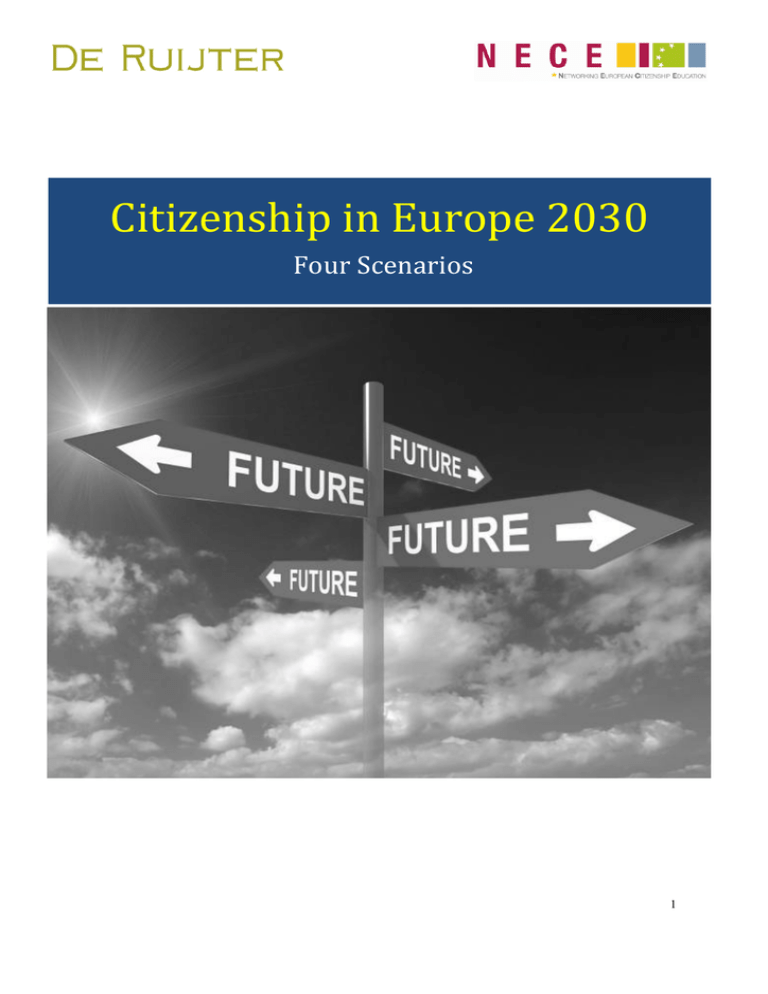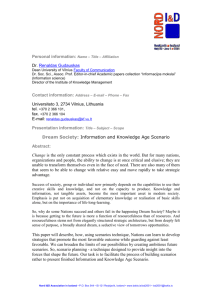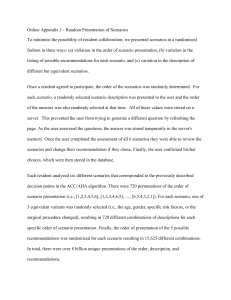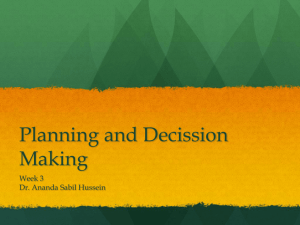Citizenship*in*Europe*2030 *
advertisement

! ! ! Citizenship*in*Europe*2030* *Four*Scenarios** * * * * ! 1 ! Content ! NECE Scenarios on the Future of Citizenship in Europe ......................................................................... 3* Four scenarios ...................................................................................................................................................... 5* Scenario A: Great Europe .................................................................................................................................. 6* Scenario B: Network of Nations ....................................................................................................................... 7* Scenario C: Union of Communities ................................................................................................................ 8* Scenario D: European Spring ........................................................................................................................... 9* The future of citizenship education .............................................................................................................. 11* Colophon .............................................................................................................................................................. 12* ! ! ! 2 NECE Scenarios on the Future of Citizenship in Europe Introduction* NECE$is$concerned$with$networking$citizenship$education$in$Europe$and$therefore$with$the$future$of$ citizenship$in$Europe$in$general.$What$opportunities$and$challenges$for$citizenship$in$Europe$lie$ ahead?$And$following$from$this,$what$does$that$mean$for$networking$citizenship$education$in$ Europe?* * Dealing*with*the*uncertain*future It$is$impossible$to$predict$the$future.$Who$could$have$predicted$the$economic$crisis,$the$Arab$spring,$ or$the$new$forms$of$active$citizenship$through$social$media?$However,$we$can$explore$the$future$by$ imagining$possible$scenarios.$Developments$and$surprises$like$those$mentioned$above$were$foreseen$ in$scenarioEexercises.$Scenario$thinking$helps$people$and$organisations$to$anticipate$and$prepare$for$ future$circumstances.$It$is$therefore$important$to$look$ahead,$especially$in$relation$to$education.$ Education$helps$citizens$to$be$prepared$for$the$future,$not$the$past!$$ Much$is$uncertain:$what$will$ be$the$effects$of$the$harsh$ economic$crisis$on$the$ political$cohesion$of$the$ European$Union?$What$will$ be$the$impact$of$the$ageing$ European$population$on$ participation$in$and$support$ for$democratic$processes?$ How$about$the$growing$role$ of$social$media,$and$new,$ often$virtual$forms$of$ participation?$These$are$only$ a$few$of$the$developments$ that$will$collectively$shape$ the$future$of$citizenship$in$ Scenario Thinking = this approach provides a structured method for collectively imagining possible futures and thinking about uncertainty. Based on a number of relevant trends, a set of two, three or four future scenarios is developed. Each scenario is a comprehensive story describing a plausible, relevant and novel future situation. The set as a whole covers a large bandwidth of future uncertainty by describing different possible outcomes in their extremes in each scenario. Scenarios are an instrument for learning with the future instead of about the future. They do not only help people to share their ideas and assumptions about the future in a meaningful way, they also enhance understanding of the causal relations shaping the world around us and find possible leverage points for intervention. Most importantly, perhaps, they help us stretch our ‘mental models’ of the world. Scenarios can be used as reference points in the future (next to reference points in the past) to ‘test’ existing ideas and visions against and to generate options for action, intervention and innovation. In short: scenarios broaden our horizon, they help us to anticipate and innovate. Europe.$$ $ From$these$trends$and$uncertainties$a$number$of$plausible$future$situations$(scenarios)$can$be$ imagined.$How$can$we$prepare$a$future$generation$of$citizens$to$deal$with$uncertainties$and$ different$scenarios$for$Europe?$And$even$more$important,$how$can$we$as$citizenship$educators$help$ this$generation$to$start$shaping$a$European$future$they$desire? 3 During$a$NECE$preparatory$workshop$from$July$7thE$9th$some$40$participants$explored$various$ scenarios$about$the$future$of$Citizenship$in$Europe.$We$used$their$input$to$create$four$different$ future$images$of$Europe$in$2030.$In$this$short$paper$you$will$find$a$description$of$these$four$ scenarios:$Great&Europe,&Network&of&Nations,&Unity&of&Communities&and&European&Spring.$ $ Key*uncertainties* The$daily$lives$of$all$people$in$ Europe$are$strongly$influenced$ by$the$European$Union$and$its$ institutions.$Basic$human$rights,$ possibilities$to$trade,$travel$and$ work$abroad,$and$the$Euro$ most$of$us$pay$with$are$all$ shaped$by$it.$In$the$last$few$ decades$we$have$seen$an$ enormous$expansion$of$coE operation$on$a$European$level$ between$our$national$ governments.$In$a$period$of$ twenty$years,$we$have$seen$the$ opening$of$borders,$the$expansion$of$member$countries,$the$introduction$of$the$Euro$and$a$closer$ unification$on$many$fronts.$$ At$the$same$time$nationalistic$and$populist$feelings$among$citizens$demonstrate$the$extent$of$a$great$ collective$uncertainty$in$European$societies.$European$citizenship$educators$are$facing$at$least$two$ major$challenges$resulting$from$this$state$of$affairs.$Firstly,$Europe’s$ongoing$economic$crisis$has$ engendered$a$crisis$of$confidence$in$the$European$project$and$the$costs$and$benefits$of$further$ European$integration.$Secondly,$the$economic$crisis$is$dividing$Europe$and$may$ultimately$lead$to$the$ breakup$of$the$EU.$The$democratic$deficit$of$the$European$Union$is$becoming$more$and$more$visible$ and$contributes$to$the$backlash$in$support$for$the$EU.$$ 4 $ How$will$this$develop$in$the$future?$Is$Europe$going$to$turn$out$to$be$the$“Eierlegende)WollMilch/ Sau”1$as$we$all$hoped$at$the$start$of$the$project?$Is$the$Union$going$to$solve$everybody’s$problems$ ranging$from$security$to$food$safety$and$from$unemployment$to$climate$change?$Are$the$next$ decades$going$to$lead$to$even$more$unity$and$integration$or$will$citizens$drive$the$Union$to$break$up$ into$regions?$Will$we$witness$the$“End$of$technocratic$Brussels”$and$the$introduction$of$a$stronger$ European$Parliament$or$even$more$direct$forms$of$democracy?$Or$will$citizens$disengage$from$the$ European$project$altogether$and$vote,$or$even$fight,$for$no$Union$at$all?$$ In$this$scenario$set$we$have$not$gone$so$far$as$to$describe$a$total$‘EU$breakEup’$scenario.$Participants$ at$the$preparatory$workshop$did$not$find$this$plausible$in$the$timeframe$to$2030.$The$two$key$ uncertainties$for$our$scenario$framework$we$collectively$decided$on$are:$$ 1. A$European$Union$in$which$topEdown$government$prevails$vs.$a$European$Union$in$which$ bottomEup$forces$become$dominant.$ 2. A$unified$European$Union$vs.$a$diversified$European$Union.$ Four scenarios 1 “eggElaying$woolEmilkEsow”$means$the$ultimate$solution$to$everything 5 Scenario A: Great Europe In&2030&the&European&Union&has&prevailed.&A&“Great&Europe”&is&on&its&way.&& In)this)scenario)the)European)Union)gets)through)the) crisis)more)or)less)in)one)piece.)European)government) has)centralized,)integrated)and)scaled)up)at)high) speed)in)the)pressure)cooker)of)economic)and) financial)strain.)Every)time)they)just)managed)to) keep)up)with)the)pace)of)change)and)finally)came)out) on)the)other)side)around)2020,)with)almost)everyone) still)on)board)and)more)developed)unitary)structures) in)place.)Complete)with)a)European)Banking)Union,)a) Tax)Union)and)a)Budget)Union)with)Union/wide) stabilization)mechanisms)to)support)member)states,)who)face)economic)downturns)or)external) shocks.)The)democratic)deficit)has)been)addressed)by)transferring)more)power,)i.e.)legislative) initiatives)and)rights)to)the)European)parliament.)) The$UK$left$the$Union$in$2018$after$the$results$of$the$‘Cameron$referendum’$in$2016$showed$that$an$ overwhelming$majority$of$British$citizens$wanted$to$do$so.$ During$the$crisis$years$nationalistic$and$populist$movements$grew$strong$while$at$the$same$time$ many$citizens$disengaged$from$formal$national$and$especially$European$politics.$In$the$European$ elections$of$2014$only$30%$of$the$electorate$showed$up$to$vote.$Basically,$this$constituted$a$ legitimacy$crisis$of$European$representative$democracy.$With$all$attention$and$efforts$going$to$ managing$the$economic$crisis,$this$one$was$at$first$completely$ignored$by$the$European$government.$$ However,$from$2014$onwards,$European$economy$improved.$Most$countries$had$taken$the$ necessary$reforms$and$most$of$the$‘pain’$from$the$austerity$measures$was$digested.$Things$started$to$ improve:$unemployment$rates$dropped,$consumer$confidence$grew$while$economic$growth$returned$ to$modest$rates.$Despite$being$badly$shaken$up,$citizens$started$to$settle$into$the$new$reality.$ Populist$parties$grew$in$size$in$national$parliaments,$but$they$did$not$win$conclusive$victories$ anywhere.$When$things$started$to$pick$up,$support$for$populist$parties$declined.$People$were$tired$of$ negativity$and$complaints,$they$want$to$get$on$with$their$lives.$Despite$protests,$social$unrest,$ massive$unemployment$and$political$crises$in$a$number$of$member$states,$the$process$of$complying$ with$the$Union’s$demands$was$never$severely$disrupted.$$ At$first$citizens$remained$sceptical$about$European$government,$although$public$support$for$the$EU$ did$not$decline$any$further.$Once$the$crisis$was$under$control$the$EU$embarked$on$a$renewed$ attempt$at$further$political$and$social$integration.$Flaws$in$earlier$designs$were$repaired.$Meaning$for$ instance$that$the$democratic$deficit$has$been$addressed.$Power$has$been$transferred$to$the$ European$parliament$and$it$now$also$has$legislative$initiative.$$ 6 There$are$new$tax$laws,$making$competition$between$member$states$on$tax$benefits$for$multiE national$corporations$a$thing$of$the$past.$There$is$a$UnionEwide$minimum$wage$and$UnionEwide$rules$ on$social$welfare,$health$care,$pensions$and$labour$market$conditions$have$been$negotiated.$$ In$2028$this$culminated$in$a$new$attempt$at$a$constitution.$Referenda$were$held$in$all$member$ states,$and$this$time$it$was$accepted$by$the$majority$of$citizens$and$therewith$by$all$member$states.$$ It$is$now$2030.$Mobility$in$the$Union$has$increased$immensely,$most$young$people$move$to$wherever$ the$action$is,$physically$or$virtually.$The$elderly$do$the$same$to$find$the$best$place$to$retire.$ Differences$between$member$states$have$slowly$become$smaller.$Poland$is$now$a$strong$regional$ economy$matching$Italy$in$size$and$Rumania$is$on$the$rise.$$ From$the$immense$pressure$the$European$Union$was$under$during$the$crisis$years,$it$emerged$more$ unified$than$ever.$A$powerful$Union$ready$for$its$next$phase$as$‘Great$Europe’$taking$up$its$position$ among$the$other$great$regions$in$the$world.$$ Scenario B: Network of Nations A&world&in&which&power&is&transferred&away&from&Brussels&back&to&nation&states.& In)this)scenario)the)centralized)one/size/)fits)/all) idea)has)been)completely)abandoned.)A)European) network)of)nation)states)is)the)result.)Varying,) sometimes)temporary)alliances)are)formed)around) economic,)environmental,)political)and)military) issues.)Another)consequence)of)this)is)that)the)EU) is)pushed)back)to)its)essence)of)a)single)market:)a) free)trade)association.)In)other)spheres)there)is)no) consensus,)so)nations)make)independent)choices)in) those)realms.)Diversity)is)embraced)and)member) states)can)now)act)with)the)speed)and)flexibility)of)a)network)instead)of)with)the)rigidity)of)a)block.)) During$the$crisis$years$up$to$2015$resentment$towards$“Brussels”$grows.$All$national$governments$ use$“Brussels”$as$their$scapegoat.$In$national$media,$it$is$“Brussels”$who$imposes$the$austerity$ measures,$and$it$is$always$“the$others$from$other$member$states”$that$are$the$problem.$Between$ 2014$and$2020$the$true$costs$to$citizens$of$the$2008$crisis$are$felt.$Citizens$lose$their$jobs,$their$ businesses.$They$feel$the$pain$of$falling$house$prices,$pension$cuts$and$reduced$services$from$their$ governments,$while$at$the$same$time$they$have$to$pay$more$tax$and$face$rising$costs.$The$promise$of$ the$fruits$for$all$of$a$free$market$and$a$single$currency$in$Europe$is$not$being$delivered.$$ So$national$parliaments$started$to$take$back$their$sovereign$powers.$After$all,$that’s$where$ democratic$accountability$resides.$This$meant$that$all$EU$national$governments$started$exercising$a$ right$to$veto$in$the$Council.$This$led$to$an$institutional$gridlock$and$thwarted$central$control.$ Unification$aiming$at$the$same$level$of$integration$for$everyone$grounded$to$a$halt,$but$at$the$same$ time$countries$started$using$the$Union$as$a$platform$for$coEoperation$and$to$set$up$bilateral$deals$ outside$the$EU$framework.$ 7 There$is$at$the$same$time$more$competition$and$more$collaboration$between$nation$states.$The$ paradoxical$effect$is$that$through$the$regained$ability$to$compete$and$coEoperate$on$a$national$level,$ many$countries$actually$improved$their$situation$in$their$own$way.$The$British$remained$British,$Italy$ has$become$more$Italian,$France$more$French$and$Denmark$more$Danish.$Feared$increases$in$ welfare$inequality$between$nations$have$not$materialized,$even$though$the$monetary$union$and$the$ Euro$did$not$survive.$$ Citizens$use$their$secondary$European$identity$in$a$practical$way;$to$travel$for$pleasure$or$work.$They$ use$the$single$market$to$their$advantage$when$possible.$Now$they$are$no$longer$forced$into$its$ unifying$regime,$most$people$feel$part$of$the$European$family$again,$but$they$primarily$see$ themselves$as$nationals$from$their$respective$nation$states.$ In$the$rest$of$the$world,$Europe$is$no$longer$seen$as$a$power$block.$The$‘Network$of$Nations’$is$seen$ as$a$soft$power,$with$a$civic$orientation.$It$is$a$set$of$free$democratic$member$states$pursuing$the$ ideal$of$coEoperation.$$ Scenario C: Union of Communities A&world&in&which&the&“DoIitIOurselves”&generation&takes&the&lead.& In)this)scenario)it)is)more)important)for)your)job,) pension,)health)or)education)to)have)a)good) social)network)than)to)belong)to)a)country)or)to) the)EU.)Everyone)is)a)member)of)multiple) communities)and)associations.)People)avoid) working)with)governments)as)much)as)they)can.) They)steer)clear)of)institutions)and)take)the) existence)of)a)single)market)and)open)borders) for)granted,)using)it)to)their)advantage)when) possible.)Philanthropy)and)social) entrepreneurship)thrive.)Participation)in)civil) society)has)become)a)necessity)for)most)people.)There)are)de)facto)two)separate)societies.)The)formal) and)institutional)sphere)of)national)and)EU)governments)with)their)focus)on)economics)and)finance,) and)a)large)informal)sphere)in)which)many)networks)of)communities)operate,)unified)in)their)multiple) and)diverse)efforts)to)shape)civil)society)for)the)benefit)of)its)members.)) For$more$than$30$years$the$turnout$at$the$elections$for$the$European$parliament$has$been$decreasing$ from$62%$in$1979$to$43%$in$2009.$This$trend$of$disengagement$from$European$politics$continued.$ People$no$longer$perceive$the$European$project$as$beneficial$and$turn$their$backs$on$it.$In$2014$only$ 20%$of$the$people$voted,$barely$providing$democratic$legitimacy$to$a$new$parliament.$$ European$and$many$national$governments$were$mainly$occupied$with$managing$the$crisis$and$their$ budgets.$Austerity$measures$had$the$effect$that$many$national$governments$retreated$and$left$ individuals$and$communities$more$and$more$to$their$own$devices.$In$many$member$nations$old$ welfare$state$structures$were$dismantled$to$very$bare$basics,$which$meant$that$for$help$and$care$in$ difficult$times$people$became$more$dependent$on$each$other. 8 These$developments$coincided$with$and$reinforced$the$EU’s$tendency$of$transferring$competencies$ to$regional$levels.$Examples$of$this$in$the$early$’10’s$are$the$Baltic$Sea$corporation,$joining$all$states$ around$the$Baltic$Sea$and$working$together$on$shared$interests,$and$the$Danube$area$strategy.$The$ latter$is$an$association$of$ten$states$who$facilitate$citizens’$initiatives$across$borders$along$the$ Danube$to$protect$its$environment$and$its$water$quality.$$ Corporations$like$those$mentioned$above$in$combination$with$business$associations,$cities,$networks$ of$cities,$regional$communities,$communities$and$all$sorts$of$initiatives$based$on$shared$professions$ or$interests,$started$to$organize$cooperation$around$a$variety$of$projects$and$goals.$This$process$was$ facilitated$by$social$media$and$the$open$structures$of$the$EU.$People$started$building$their$own$civil$ society$bottom$up.$Many$societies$in$Europe$already$had$strong$associations$on$all$levels;$local,$ regional,$national$and$European.$Where$these$organizations$saw$a$steady$decline$in$membership$up$ until$2014,$their$tide$turned$dramatically.$By$2025$civil$society$in$Europe$was$a$widely$branched$ network$of$communities,$organized$along$all$sorts$of$different$lines$and$shared$interests:$regional,$ local,$professional,$environmental,$cultural$etc.$$ People$are$still$aware$that$they$belong$to$a$nation$state$and$the$EU,$but$living$in$a$$‘Union$of$ Communities’$their$local$and$interestEbased$(crossEborder)$identities$and$affiliations$are$much$more$ important$to$them.$$ Scenario D: European Spring A&world&in&which&large&groups&of&people&take&to&the&streets&and&more&direct&democracy&is& demanded&and&realized. & In)this)scenario)the)trend)of)centralization)in)the) European)Union)is)reversed.)Traditional)power) hegemonies)are)besieged)by)all)sorts)of) movements)that)use)combinations)of)liquid) democracy)and)charismatic)leadership.)Citizens) reclaim)their)political)power)and)democratic) right,)forcing)the)Union’s)institutions)to)the) sidelines.)Power)is)decentralized)by)the) introduction)of)direct)and)participatory)forms)of) democracy.)People)align)(temporarily))on)issues) and)choose)their)political)leaders)by)following) them)on)liquid)democracy)platforms)and)then)voting)them)in)and)out)of)office,)by)‘liking’)or)‘disliking’) them)and)by)very)quickly)mass/mobilizing)around)certain)topics. In$October$2010$former$ambassador$and$concentration$camp$survivor$Stéphane$Hessels$wrote$“Get$ Outraged!”,$which$spurred$the$beginning$of$an$everEgrowing$protest$movement$throughout$Europe.$ Year$by$year$the$true$costs$of$the$2008$financial$crisis$were$being$felt$by$more$and$more$citizens.$ Where$initially$the$crisis$was$felt$mostly$in$Greece$and$Spain,$with$youth$unemployment$as$high$as$ 50%,$by$2015$almost$all$citizens$of$Europe$were$feeling$the$pain$of$massive$unemployment,$ 9 repossessed$houses,$lower$salaries,$the$breakup$of$social$welfare$and$increasing$social$inequality$ between$rich$&$poor,$north$&$south,$old$&$young.$More$loans$for$Greece$were$on$the$European$ agenda.$Interest$rates$of$countries$like$Greece,$Spain,$Italy$and$even$France$started$rising$again.$$ This$next$round$of$crises$proved$too$much$for$the$already$weak$support$for$solidarity$in$the$Union.$ Acceptance$turned$into$refusal$and$then$into$rage.$Demonstrations$were$held$everywhere.$The$ number$of$protesters$grew$bigger$and$bigger,$spreading$from$capital$cities$to$regional$ones.$ Charismatic$leaders$“climbed$on$top$of$this$bottomEup$revolution”$and$joined$the$crowds.$Country$by$ country$saw$a$new$generation$of$charismatic$political$leaders$take$the$stand.$Leaders$with$hundreds$ of$thousands$of$Facebook$friends$and$Twitter$followers$started$to$win$local$and$national$elections.$$ In$many$countries$this$meant$political$instability$for$many$years.$Governments$were$elected$and$ failed$over$and$over$again.$Traditional$political$parties$formed$broad$coalitions$to$counter$these$new$ forces.$In$around$2025$most$national$parliaments$were$made$up$by$40%$or$sometimes$even$60%$of$ movements$that$used$liquid$democracy$platforms$to$determine$their$political$agenda$and$choose$ their$expert$representatives.$On$these$platforms$citizens$can$put$up$issues$they$want$addressed$and$ vote$for$expert$representatives$and$political$leaders$directly.$Issues$like$‘saving$the$euro’,$the$ ‘financial$system’$and$the$‘3%$criteria’$were$hardly$on$the$national$agendas$anymore,$citizens’$ interests$were.$However,$common$ground$was$hard$to$find.$Fragmentation$brought$about$conflicts$ between$divergent$groups$and$opinions.$In$many$places$separation$movements$sprang$up.$ These$developments$sideEtracked$the$European$Union$completely;$all$it$could$do$was$loosely$coE ordinate$the$policies$of$member$states,$which$became$increasingly$difficult$because$of$the$increasing$ fragmentation$between$states$and$the$volatility$of$their$national$politics.$ In$2030$social$media$and$virtual$platforms,$used$by$both$young$and$old,$have$revolutionized$the$ interaction$between$citizens$and$their$governments$at$all$levels.$At$the$local$level$for$instance$virtual$ citizen’s$tables$structure$unmediated$horizontal$coEoperation$between$different$stakeholders.$$ Similar$tables$are$formed$regionally$and$even$transnationally.$The$transition$to$direct$democracy$and$ the$emancipation$of$citizens$is$not$an$easy$process,$but$it$seems$that$slowly$but$surely$people$are$ learning$to$use$their$new$powers$and$responsibilities$constructively.$In$the$social$media$and$on$the$ virtual$platforms,$language$is$changing.$Discussions$with$antagonistic$and$often$abusive$language$are$ transforming$into$dialogue,$appreciative$inquiry$and$constructive$design$thinking.$$ In$2030,$it$is$too$early,$either$to$celebrate$the$‘European$Spring’$as$a$victory$for$a$new$age$of$ democracy$and$the$empowerment$of$people,$or$to$curse$it$as$a$system’s$failure$leaving$us$with$a$ highly$dysfunctional$selfEguiding$team$of$820$million$European$citizens.$ 10 The future of citizenship education As$mentioned$in$the$introduction,$scenarios$are$an$instrument$for$learning$with$the$future.$None$of$ the$scenarios$described$above$will$come$true,$but$we$will$probably$see$elements$of$all$scenarios$ materialized$in$the$future.$What$makes$the$scenarios$valuable$is$the$contribution$they$make$to$ thinking$about$the$future$of$citizenship$education.$$ In$each$scenario$citizens$participate$and$define$their$identity$in$different$ways,$leading$to$different$ implications$and$options$for$Citizenship$education.$$ For$example:$What$would$be$the$implications$of$‘A$Network$of$Nations’$or$a$'European$Spring'$for$ citizenship$education$and$its$approaches$and$projects?$How$can$we$as$citizenship$educators$ anticipate$and$prepare$for$these$opportunities$and$challenges?$Which$scenario$is$likely$to$lead$to$ more$citizens'$participation$and$which$are$not?$And$what$role$can$citizenship$education$play$in$each$ of$these$scenarios?$Should$we$rethink$our$current$projects$and$approaches$towards$European$ citizenship$education?$What$options$do$we$have?$Thinking$through$all$these$scenarios$might$lead$to$ ideas$for$innovation,$new$topics,$approaches$and$projects.$Or$perhaps$they$help$us$see$that$some$ approaches$or$projects$that$have$been$successful$in$the$past,$no$longer$fit$the$future.$$ We$have$no$political$intentions$with$this$set$of$scenarios.$We$have$tried$to$write$them$in$such$a$way$ that$they$contain$both$positive$and$negative$aspects.$$Most$probably,$you$will$have$a$preference$for$ and$perhaps$also$a$feeling$of$resentment$against$one$or$more$of$the$scenarios.$$Naturally,$we$have$ too.$$ However,$scenarios$are$only$meant$as$tools$to$help$you$stretch$your$mind$and$think$about$things,$ even$the$things$you$do$not$like.$Allowing$yourself$to$imagine$all$of$these$situations$might$actually$ help$you$to$find$strategies$to$strive$for$the$future$you$do$want/or$make$sure$some$futures$will$never$ happen.$Scenarios$help$you$align$your$vision$with,$and$test$it$against$circumstances.$$ Therefore,$we$would$like$to$invite$you$to$allow$yourself$to$imagine$all$scenarios$as$potential$futures.$ Feel$free$to$use$them$to$your$advantage$when$it$comes$to$citizenship$education.$We$are$looking$ forward$to$your$ideas!$Enjoy$the$conference!$$ 11 Colophon Subject$ $ Citizenship&in&Europe&2030,$a$NECE$workshop$in$The$Hague) Date$ $ 7E9$July$2013$$ Commissioned)by$ $ NECE$Networking$European$Citizenship$Education$ an)initiative)promoted)by)the)Federal)Agency)for)Civic)Education/)bpb)(Germany)) ) Participants$ $ ) External)support)$ $ Renate$Kenter,$Paul$de$Ruijter,$Jolanda$van$Heijningen$$ De$Ruijter$Strategy,$Molenweg$32,$1182$CL,$Amstelveen,$The$Netherlands$ Tel.$+31$20$625$02$14,$www.deruijter.com$$ 12



